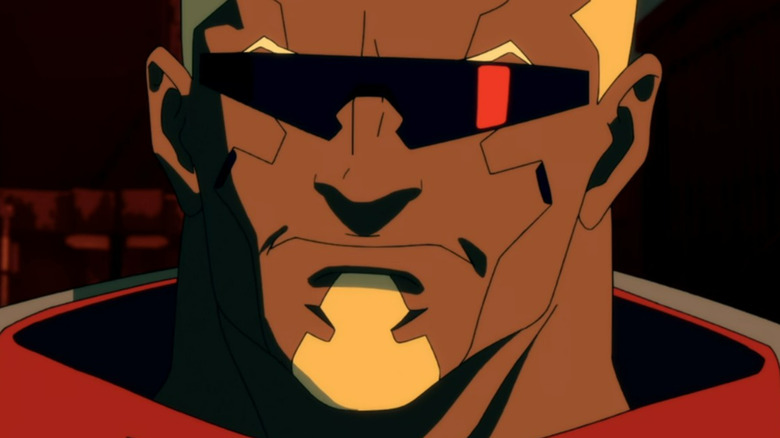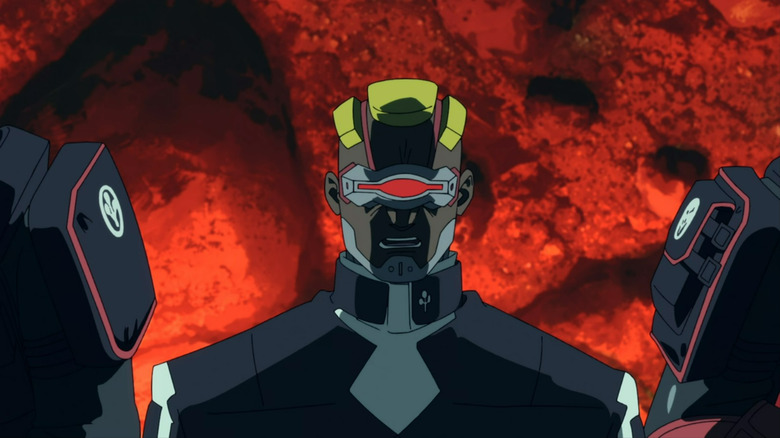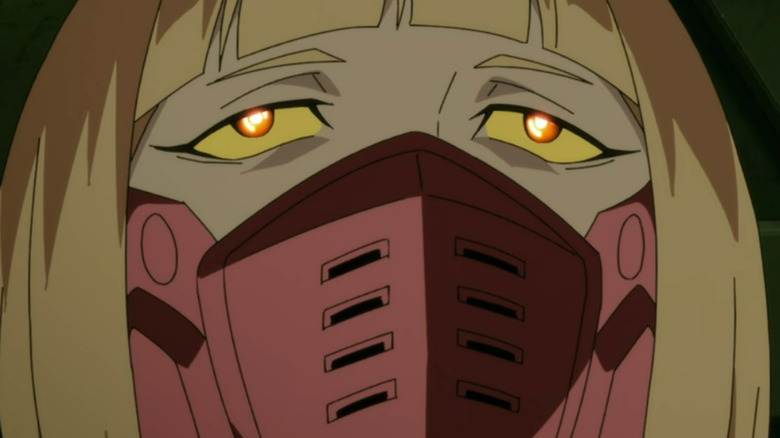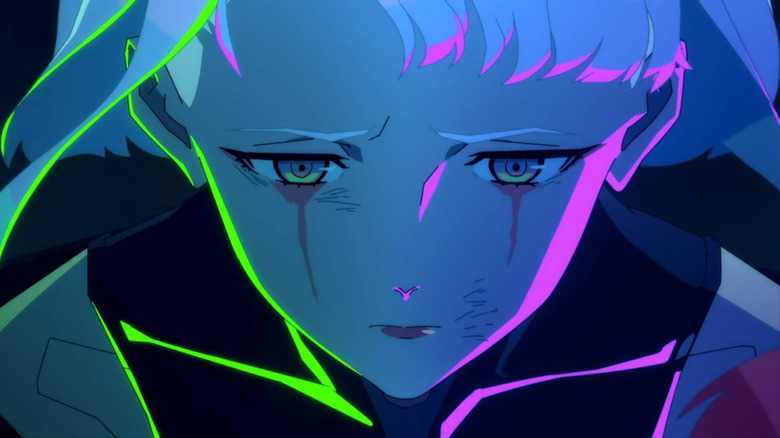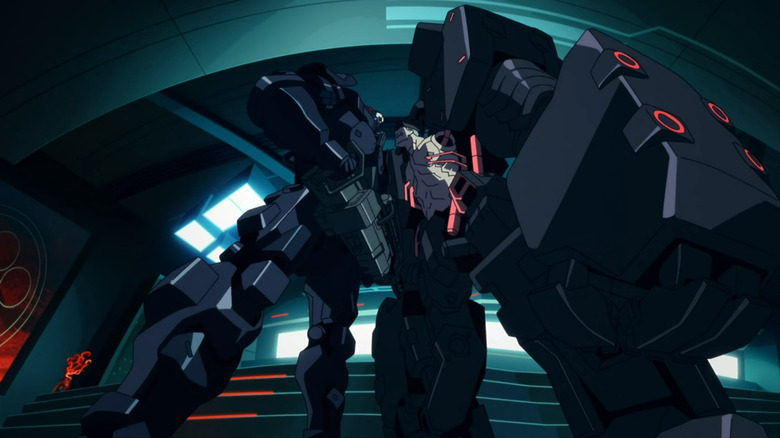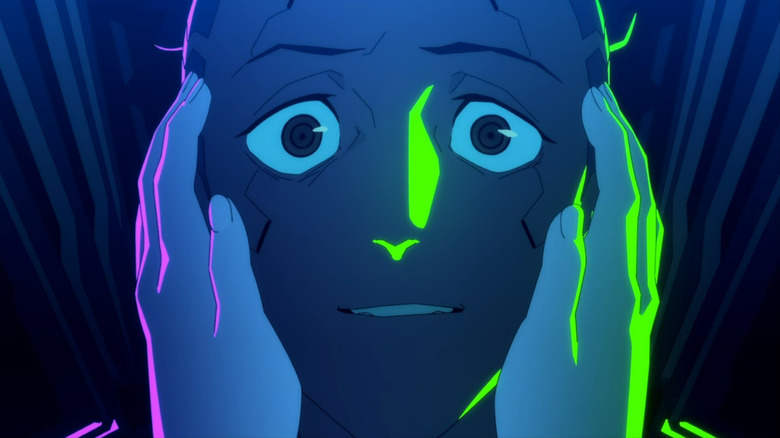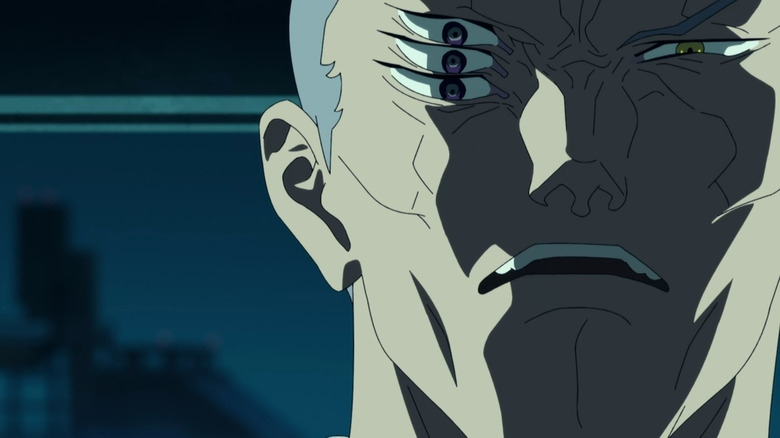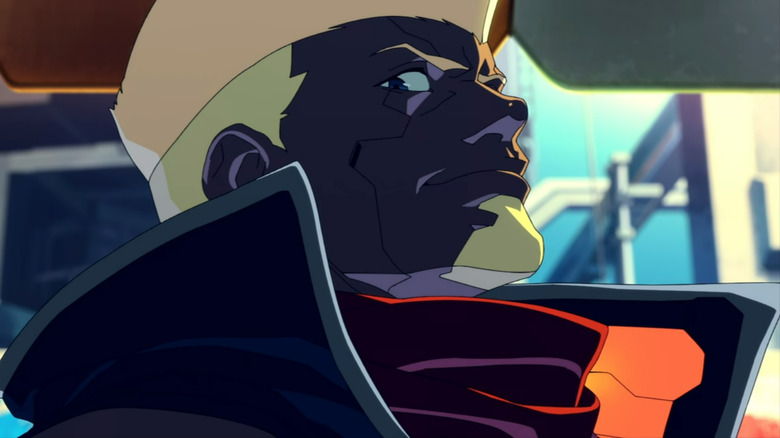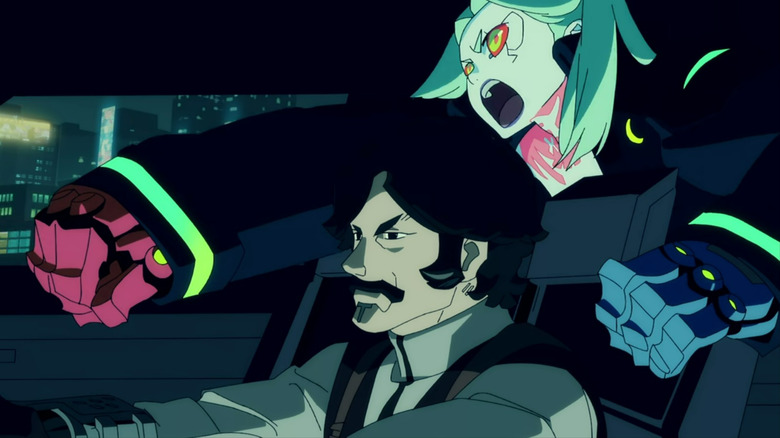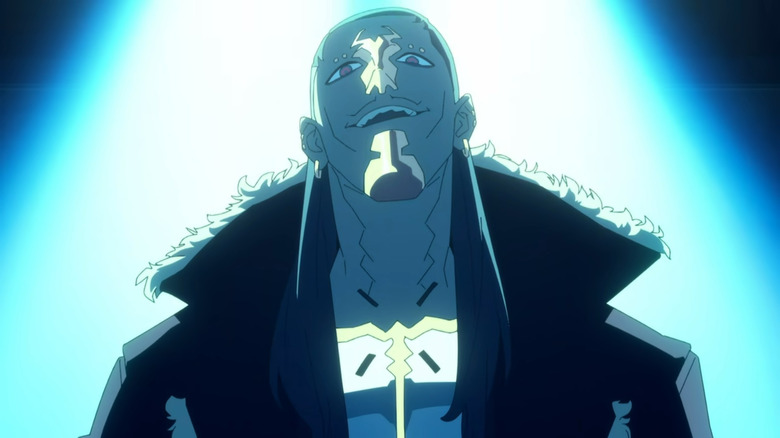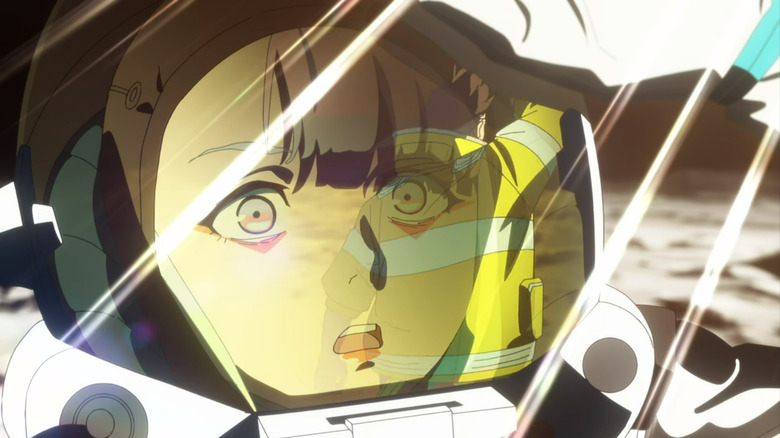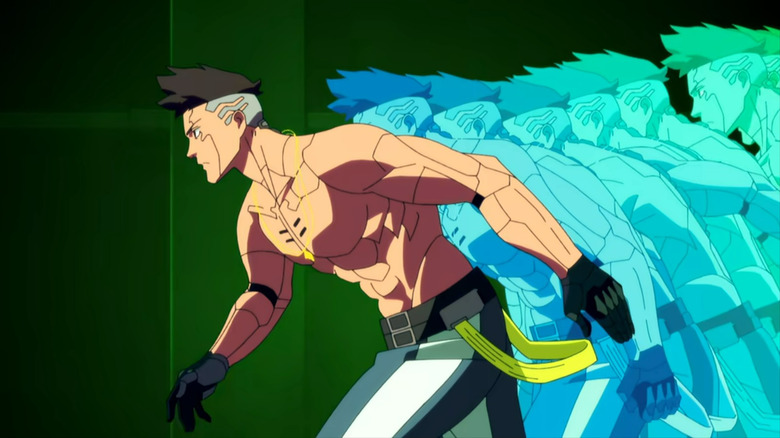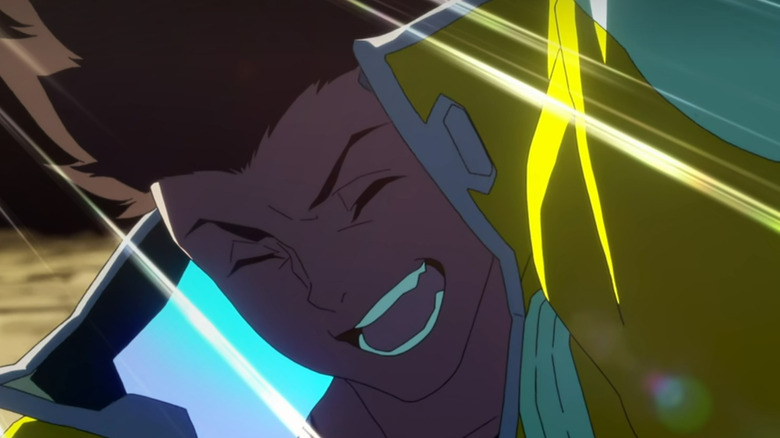Cyberpunk: Edgerunners' Biggest Unanswered Questions From Season 1
Though it may be composed of just 10 half-hour episodes, "Cyberpunk: Edgerunners" Season 1 is densely packed from start to finish. Every shot is loaded with little visual details and every conversation between characters comes loaded with foreshadowing and double meanings. Between the bright neon lights of Night City and the frenetic pace of David Martinez's story, it can be hard to keep up with it all. As a result, there are a lot of things in "Cyberpunk: Edgerunners" Season 1 that are left unresolved or wholly unaddressed.
That's not to say that the show is sloppy in its execution — far from it. Season 1 tells a beautifully self-contained story that follows David from the beginning of his journey as a cyberpunk to his violent end. Most of the big-picture arcs are wrapped up quite cleanly by the end of "Cyberpunk: Edgerunners" Season 1, albeit in more somber ways than some viewers may have hoped for. Still, Night City is simply too big of a location — and "Cyberpunk" is too big of a franchise — for the show to answer every question in just 10 episodes.
Some characters only get brief explanations for their decisions and personalities. Others are written out of the show in less than definitive ways. From personal motivations to what happens next, here are the biggest unanswered questions from "Cyberpunk: Edgerunners" Season 1.
What is Arasaka's actual plan?
From the moment he beats up Katsuo Tanaka with his newly-installed Sandevistan, David Martinez is on Arasaka's radar. The company's plan, which isn't fully revealed until much later in the season, is to use David as a test subject for their experimental cyberskeleton — an exosuit meant to help them gain ground on rival corporation Militech in the weapons business. Of course, that scheme becomes a bit harder to execute when David drops off the grid and becomes an edgerunner.
While the show outlines the basics of Arasaka's plan, some details still don't quite add up. David is an ideal candidate because of his naturally high tolerance for cyberware implants, but even he can't wear the exosuit for long. To be fair, he's already on the brink of cyberpsychosis when he installs the cyberskeleton, so he's doomed from the start. Still, it's unclear whether or not things would have been any different if he had fewer implants to start. Lucy tells him that she knew if he installed the suit, he'd die, implying that the data she saw in Tanaka's files convinced her of this. So maybe the cyberskeleton would have killed David either way.
But then what was the point of tracking him down? One field test, followed by a dearth of capable test subjects to take up the mantle? A weapon that kills the user in hours doesn't seem too marketable, but clearly, Arasaka's ways are mysterious to the common cyberpunk.
Why does Kiwi betray the crew?
One of the most shocking moments in "Cyberpunk: Edgerunners" Season 1 occurs when Kiwi, the veteran netrunner of Maine and David's crew, sells her comrades out for an Arasaka payday. Faraday approaches her specifically to encourage her to betray her friends, and he clearly picks the right person. It's hard to imagine Rebecca or Falco stabbing David and Lucy in the back, but Kiwi is ready to switch sides for the right price.
To be fair, this turn can be explained simply through Kiwi's characterization. She's a hardened criminal who's had a rough run of it, and she repeatedly espouses the idea that you can't trust anyone but yourself. It seems that she was just ready to cash out — tired of the same life of dangerous missions and going on the run. Of course, things don't turn out the way she plans, and she gets killed by the very people who were supposed to be her salvation.
In the end, though, Kiwi clearly regrets betraying her friends and even tries to help them. This shift begs the question — why did she really agree to the deal in the first place? If she trusts no one, why trust Faraday and Arasaka? She probably would have had better odds sticking with the crew that's had her back for years, and turning on them seems like an odd lapse in judgment. Maybe that's just what Night City does to people.
Why doesn't Lucy tell David about Arasaka?
When Lucy breaks into Tanaka's files and discovers Arasaka's plans for David, she's pretty shaken up. She steps back from the crew, claiming that she just needs some time to get back in the swing of things. In reality, she's working secretly to make sure that Arasaka's schemes never come to fruition.
While this is certainly a noble and understandable pursuit, there is one thing about it that doesn't quite add up. Why doesn't Lucy tell David anything about what she learns? You'd think that him being aware of Arasaka's intentions would help them be better prepared. He could have helped Lucy track the company's agents down, which might have prevented her capture. Maybe the rest of the crew could have been brought into the fold earlier to give a better chance of bringing the company down. Maybe, if Lucy had just talked to David, things would have turned out differently.
While it's never explicitly said why Lucy keeps this secret, there is one likely explanation. For most of "Cyberpunk: Edgerunners," David is portrayed as a good kid who's been dealt a bad hand. In reality, though, he becomes obsessed with his own theoretical invincibility. He believes himself to be "special" and way overdoes it on the cyberware to prove this belief. Lucy knows this, and she knows that his ego would compel him to try the cyberskeleton if he knew about it, despite it being a bad idea. When she finally sees him in the exosuit, she's clearly dismayed. "You installed it," she says. "Of course you did."
Could David have survived the cyberskeleton?
By the time David actually installs the cyberskeleton, he's too far gone to make it out alive. He's been phasing in and out of cyberpsychosis for some time, and he's clearly losing his grip on reality. Plus, the reason he installs the suit in the first place — saving Lucy from Arasaka and battling Adam Smasher — is basically a suicide mission. However, is it possible that under different conditions, David might have been able to endure the cyberskeleton long-term?
Maybe if he hadn't gone so crazy on the cyberware beforehand, he could have stood a chance. The Sandevistan and one or two other, smaller implants, perhaps. Maybe the toll of the cyberskeleton wouldn't have pushed him over the edge into oblivion. Perhaps then he could have had a happier ending.
Of course, this is the kind of thing that's impossible to know for sure. The cyberskeleton is just a prototype, so it's possible that its heavy load would have been too much for David to bear at any point in the story. Still, it's hard not to wonder how things might have gone if he'd followed the corpo path and returned to Arasaka Academy following his mother's death. He might not have met Lucy, but maybe he would have lived.
Is David actually dead?
The ending of "Cyberpunk: Edgerunners" Season 1 is pretty brutal. Kiwi is gunned down by corpo muscle after reneging on her deal with Faraday. Rebecca goes out guns-blazing in a losing battle against Adam Smasher. Only moments later, David meets a similar fate, ultimately realizing that he's not the most powerful force in Night City after all.
But is David actually dead? The answer would seem to be a definitive yes. His body is broken and battered at the end of his final fight, with whole cyber chunks being ripped off wholesale. To finish the job, Adam Smasher delivers a bullet straight to the head, mirroring the final shot of the show's intro sequence.
However, things might not be as simple as they seem. Before seemingly finishing David off, the cyborg makes an interesting claim. "You could prove an interesting construct," he says, suggesting that David could be transformed into something like him. David's response is flippant and dismissive, and Adam Smasher seems to give up on the idea, but the way the scene is shot leaves some reasonable doubt as to what actually happens. In other words, don't be too shocked if a fully borged-out David appears in "Cyberpunk: Edgerunners" Season 2, should the show continue.
How is Faraday so easily fooled?
While far from the ultimate evil in Night City, Faraday is the main face of villainy for most of "Cyberpunk: Edgerunners." Sniveling and malicious, he pulls the strings that lead to the slow destruction of Maine's crew, even converting Kiwi to the corpo side and kidnapping Lucy in the season's final act. Through it all, Faraday appears to be a smooth operator — a man who plays all the angles and is never shy to stab an associate in the back. Yet he's completely blindsided by the way Arasaka treats him in the Season 1 finale.
This seems, at the very least, somewhat inconsistent. As he's taking Lucy into Arasaka, Faraday monologues about how someone like him being brought into the corporate fold is nearly unprecedented. He envisions the luxurious life that will await him on the other side of the tracks, so to speak. These don't sound like the thoughts of a street-smart fixer ready for every contingency. When Faraday is denied admittance into Arasaka, it's hard not to feel like he should have seen it coming.
Perhaps Faraday simply let his hope get the better of him. Perhaps, like Kiwi, he just grew tired of fighting for a life that didn't satisfy him. Or maybe — just maybe — Faraday isn't quite as smart as he looks.
What is Maine fighting for?
For the middle chunk of "Cyberpunk: Edgerunners" Season 1, Maine is one of the driving forces in the story. As the leader of a particularly tough crew of edgerunners and one of the strongest cyberpunks in Night City himself, he's a force to be reckoned with. Watching his decline into cyberpsychosis is hard to watch, especially after he becomes such a father figure to David. Unfortunately, the show doesn't have enough time to properly explore why Maine started down this path in the first place.
The simple answer, which will be enough for most viewers, is that Maine is stuck in the vicious cycle of Night City. He likely started his life of crime out of desperation and continued it out of necessity. Still, there's surely more to Maine's story. At one point, he laments that he's come too far to turn back, presumably referencing his many augmentations. Still, there seems to be an implication that his motivations might be more complicated.
In the episode where he goes full-on cyberpsycho, he gets frequent visions of being in a different place entirely. We see a young, unaugmented Maine running through the desert. Are these memories? Metaphors? Hallucinations? It's never made clear. The only thing that is clear is that Maine believes he has no other options — that running headlong toward oblivion is the only path available to him, regardless of what made it that way.
What's the deal with Falco?
Of all the members of Maine's crew, the fabulously mustached getaway driver Falco is the most mysterious. He gets the least screen time, the least dialogue, and the least overall character development, but he's also one of only two characters to make it out of the season alive. Cool, calm, and collected at (almost) all times, Falco seems to view his comrades as family. He adopts something of an older brother or uncle relationship with most of them, and he does everything he can to keep them safe.
So what's the deal with Falco? Why is he so much less decked out with cyberware? Why does he only ever drive? How did he fall in with Maine and the crew to start with, and why does he stick around so long? In shows like "Cyberpunk: Edgerunners," you're bound to have at least one enigmatic side character whose true motivations and backstory are withheld. Falco is about as archetypical as archetypes go in that regard. That doesn't stop him from being a deeply compelling part of the ensemble — and it certainly doesn't stop him from putting the pedal to the metal and helping out his friends when they need him most. What he'll do with his cut of the money after Season 1 is anyone's guess, but hopefully he gets some time to rest.
How much damage has Jimmy Kurosaki caused?
Famed braindance creator Jimmy Kurosaki is a relatively minor character in the grand scheme of "Cyberpunk: Edgerunners," but he still plays an important role. His BDs are the reason that David dreams of becoming an edgerunner — and the reason that he instantly buys into the myth of his own invincibility. However, when he comes face to face with Kurosaki, he realizes that the man he's idolized isn't exactly what he expected. The BD director kidnaps David and tortures him brutally, attempting to turn him into the cyberpsycho star of his next film. Fortunately, the crew comes to David's rescue.
The implications of Kurosaki's dark side are haunting. How many violent, murderous cyberpsycho incidents have been directly caused by his experiments? How many people has he pushed over the edge through psychological torment? How many innocents have died because of his pursuit of the next great BD?
"Cyberpunk: Edgerunners" doesn't have enough time to dwell long on these questions, but Kurosaki's shadow lingers. He serves as a reminder that life on the streets isn't romantic and that anyone claiming it to be is selling something. Sadly, David continues to buy into the idea that he can escape the fate that's chasing him, even after seeing behind the curtain.
Will Arasaka keep searching for Lucy?
While Arasaka's primary interest in "Cyberpunk: Edgerunners" is David — because of his aptitude for the cyberskeleton project — the company is also interested in Lucy. As she reveals late in the season, Lucy was raised in an Arasaka facility under horrendous conditions and trained to be a netrunner for the corporation. Ever since her escape, she sleeps with one eye open, wondering if they'll find her.
Since she fulfills her dream of moving to the Moon at the end of Season 1, it would seem that Lucy is now finally safe from Arasaka's reach. However, that's hard to say for sure. The company's arms are long and strong, and they almost certainly have agents on the Moon as well as on Earth. Given all the damage that Lucy causes to the company and the major investment they placed in her during her childhood, you'd think they might still have an interest in getting her back.
Fortunately, Lucy has a few things going for her. She's more than capable of taking care of herself, and even if Arasaka does have operatives on the Moon, they certainly don't wield the kind of power that they do in Night City. Additionally, the company only really started pursuing Lucy again because of her connection to David. With him dead and the cyberskeleton test complete, she may not even be worth the resources required to continue the search.
Why does David have such a high cyber tolerance?
Despite falling into delusions of grandeur, David Martinez is indeed a special person. His natural aptitude and tolerance for cyberware is absurd, to the point that it impresses both his crew and the ripperdoc who installs his implants. Of course, even David has his limits, as he realizes too late. So why exactly is his capacity for augmentation so high?
Legendary game designer Mike Pondsmith, the creator of the original "Cyberpunk" tabletop RPG, has shared his own thoughts on the matter. Writing on Reddit under the username u/therealmaxmike, Pondmsith explained that cyberpsychosis requires "an inherent susceptibility, which (in the TRPG) is represented by the player's Humanity Stat." He went on to explain how it would make sense for David to have a naturally high humanity stat and therefore a significant resistance to cyberpsychosis. "David's starting Humanity was probably already pretty high," Pondsmith said. "And before things went to crap, he had a loving mother, a career path, and no more hassle than the average poor guy in a wealthy Ivy League school. So he had lots of buffer. But even so, he still, even after losing all that, was able to make friends, build a replacement family, and (after some prompting) even get a girlfriend."
That all helps to explain the mystery of David, but it's still not a definitive answer for just how exceptional he is. Of course, that's part of what makes his story so compelling.
Did David ever have a chance?
Perhaps the biggest question "Cyberpunk: Edgerunners" Season 1 leaves unanswered is also at the core of the entire story — did David Martinez, a kid whose only initial crime was being born on the wrong side of the cyber tracks, ever have a chance? It's easy to say no. With his mother dead at the hands of a corrupt establishment, no money to his name, and his classmates bullying him out of school, it's completely understandable when he turns to a life of crime. Sure, he could have returned to Arasaka Academy and become their cyberskeleton guinea pig, but he likely wouldn't have lasted long.
David's plight is so grave and his demeanor is so wholesome that it's easy to see him simply as a victim of fate. Yet, there are a lot of small details in "Cyberpunk: Edgerunners" that complicate that idea. Before he ever gets an implant, we see that David has a habit of denying his weaknesses. He ignores his nervous twitches and excitedly embraces the idea that he might be truly special. Once he starts down the path of augmentation, there's no stopping him. At times, it seems like David isn't really interested in surviving at all. Instead, he's interested in taking a more spectacular leap off that cliff than anyone ever has before.
Yet, even with that more complicated understanding of David's personality, did he really have a shot at escaping his fate? His obsession with strength is fostered by a healthy diet of tough living and cyberpsycho BDs. Perhaps the old cliché is true — maybe the poor kid never stood a chance.
